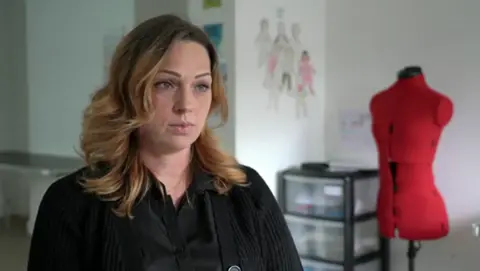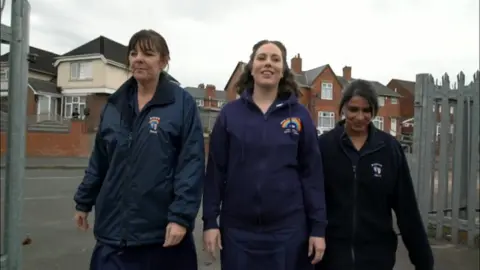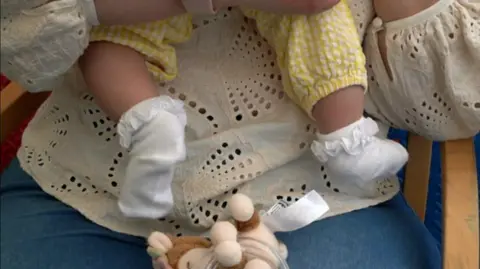'Three Walsall midwives changed my life'
 BBC
BBC"It's so important to know there is someone standing by your shoulder and offering you support at the time when you need it the most."
For a long time Aiga Dalberga felt she had to navigate motherhood alone.
Ms Dalberga delivered her baby daughter by herself after she was turned away from the hospital and "refused help".
It was not until years later when she visited a clinic that supports parents who have suffered the loss of a baby or have experienced a traumatic birth, that she realised her life could change.
The Calm Connections Clinic in Walsall is run by three specialist Walsall Healthcare NHS Trust midwives who offer a space for women to talk openly about their fears.
The clinics, which are held in the MindKind and Wellbeing Centre, aim to help women have the best possible experience of pregnancy.
Mental health specialist midwife Hari Nijjar said pregnancy was supposed to be a "really special" time.
Women who had experienced negative pregnancy and birth experiences can call on the joint-expertise of the three midwives.
"For so long felt like I was by myself," Ms Dalberga said.
"When you need that support they will be there with you," she added.

Hannah Sheppard also attended the clinics and agreed that the initiative had changed her life.
Ms Sheppard's mum died when she was pregnant and a previous ectopic pregnancy and miscarriage left her anxious until her daughter was born.
The specialist midwives understood "why I felt the way I did, why I felt so scared", she said.
'Exciting first for the city'
In addition to the support provided by the Walsall clinics, a new device designed to help prevent miscarriages is set to be trialled in the West Midlands.
Prof Siobhan Quenby MBE from University Hospitals Coventry and Warwickshire NHS Trust (UHCW) has created a new product that aims to improve the absorption of the hormone progesterone.
The hormone has been recommended to prevent early miscarriage as it helps prepare the womb for the growing baby.
If approved, it would become the world's first drug-device combination product to treat threatened miscarriage.
"I am very confident it's going to help people all over the UK and across the world," Prof Quenby said.
The device will be trialled in Coventry, which Prof Quenby said was a "really exciting first" for the city.
"It's going to help the lives of thousands of woman whose lives are made very difficult", she added.

Amy Jackson from Balsall Common founded the Lily-Mae foundation with her husband in 2012, to support bereaved parents after their daughter was stillborn.
Ms Jackson said the foundation supported Prof Quenby's trial and added that she knew how important it was to help families "get some answers" when they had experienced "such a traumatic time".
Statistics suggest that one in four women experience a miscarriage, she added.
Ms Jackson said families who had experienced miscarriage were "really isolated".
"It's really not talked about and people are so unaware of the massive numbers of people that are affected daily."
"It just affects every part of your life, going back to work, your relationships, thinking about planning for your future."
Follow BBC Birmingham on BBC Sounds, Facebook, X and Instagram.
